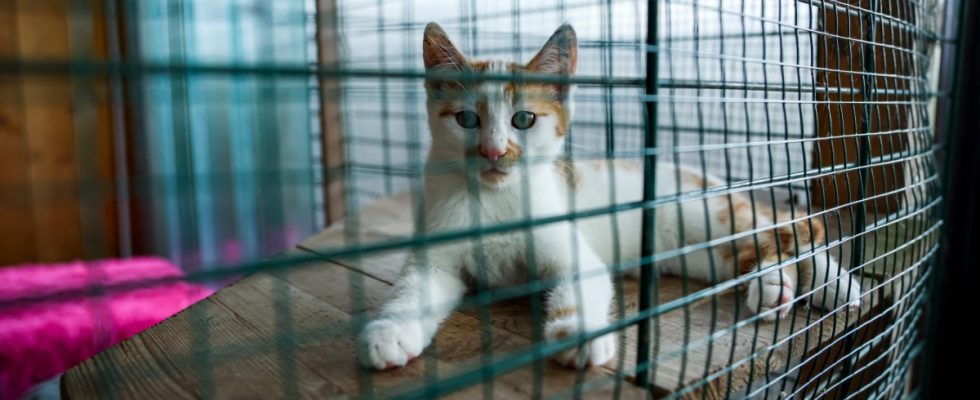Ten young Maltese-Poodle mixes, “designer dogs” from a backyard breeder in Hungary; plus two Pomeranians, two French bulldogs, other puppies – Christine von Hake, head of the animal shelter in Freilassing on the border with Salzburg, lists them. And there are a good 20 smuggled animals for the illegal trade that were confiscated by the federal police this year alone and ended up in the animal shelter. There are more found animals anyway, almost everywhere in Bavaria. And finally, many “corona pets” – which were in demand during lockdowns with a lot of time at home, but are no longer wanted or have become too expensive to maintain.
Overcrowding, staff at the limit, too little money – there are now more and more frequent admission stops or waiting lists for dogs and cats, as the Bavarian regional association in the German Animal Welfare Association confirms. The 85 facilities organized under the umbrella help each other, check where there is still capacity; but often without success, reports President Ilona Wojahn, who runs the Quellenhof Passbrunn in the Dingolfing-Landau district. At the same time, the length of stay is increasing, especially for dogs, often due to illness or behavioral problems. This also reduces the chance of further placement. And there is a lack of money. The municipal flat rates for found animals “never cover costs in life,” says Freilassing animal rights activist Hake. And other support? Almost none, “we do government work and get practically nothing for it.”
Is the Free State doing enough? The Greens are now raising the question. During the budget negotiations in the state parliament on Tuesday, the Environment Ministry’s individual plan will be discussed in the committee. There is an investment pot of 1.3 million euros per year for animal shelters, which according to planning remains roughly the same, despite inflation. And there is a funding line for running costs, previously 500,000 euros per year, now only 300,000 are planned. Paul Knoblach, spokesman for the Greens for animal welfare, considers the approach of the CSU and Free Voters to be “neither compatible with animal protection nor with it “Obviously false promises to strengthen voluntary work”. There is a risk of “bleeding out”. In a motion, the SPD is also calling for the reduction to be reversed and for it to be increased. The sum, writes the SPD parliamentary group, represents “almost an affront” to the many committed animal rights activists.
The state government is not planning any cuts, replied a spokesman for the Ministry of the Environment when asked by the SZ. The goal is to provide “sufficient funds for animal shelter funding in 2024 as well.” In 2023, in addition to the regular funds, remaining expenses from the previous year as well as one-off money from so-called faction initiatives were added. In total we can speak of around two million euros. And there could still be such remnants in the future. Environment Minister Thorsten Glauber (FW) also announced that financial support for animal shelters “is an important concern for us” and that the funding conditions have recently been improved. He would like to thank the people who are committed to animal protection with great commitment.
In fact, there were recently leftover expenses, so the budget estimate was not exhausted. The opposition does not cite a lack of need as the reason, but rather daunting hurdles and complicated forms. Last year, the ministry sent a report to the state parliament: In 2022, animal shelters wanted funding 41 times, for construction work, equipment, animal placement and castrations. The award was only made 31 times. Christine von Hake also complains about the bureaucracy; For example, you have to “get completely naked” as an applicant even when it comes to smaller needs.
Animal Welfare Association regional head Wojahn says the funding itself is “just a drop in the ocean. And it will be cut back.” She wants basic funding, a nationwide regulation that is “not a subsidy business for animal protection.” Food prices, energy and veterinary costs are a concern for many homes. In general, they are financed through patchwork budgets that are difficult to plan. Donations are a big pillar, but a volatile one. In Freilassing you benefit from an inheritance, which can sometimes save homes from failure or provide a stroke of luck for necessary renovations; In many places the buildings are getting old. In addition, there are flat rates for found animals from the municipalities, which, according to the Animal Welfare Association, are too low. For smuggled animals like in Freilassing there is a fee of 15 euros per animal per day. Not enough for the “immense effort”, says Hake, it’s often about baby dogs that have to be quarantined and that need a lot of care and attention.
Anyone who gives away animals privately has to pay a fee and certain costs. The experience in Freilassing: Only about half actually pay. The animals are usually taken in anyway before they are abandoned, roam around and end up in the animal shelter completely disturbed. Apparently there are already so many stops in Bavaria that calls are even coming from northern Bavaria in Freilassing – asking if there is still anything available there.

